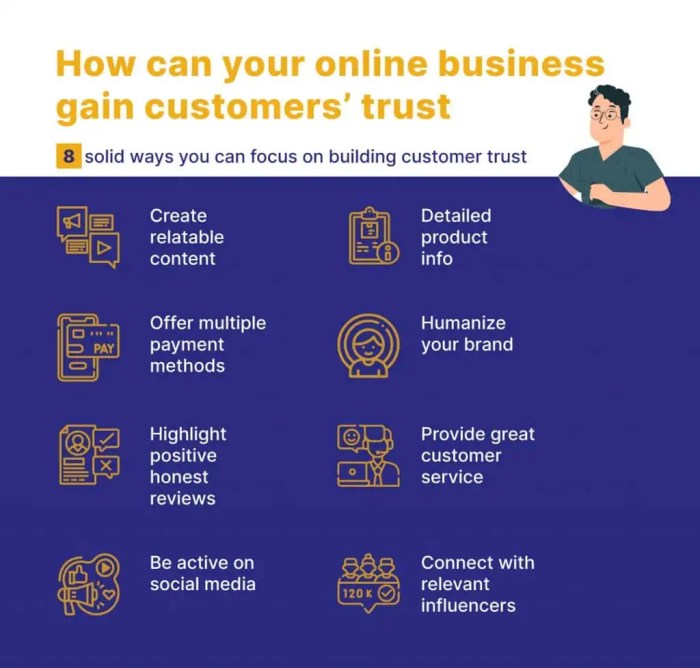Building Customer Trust Online sets the stage for businesses to thrive in the digital world by establishing authentic connections with their customer base. Dive into the realm of trust-building strategies that are essential for online success.
From the importance of transparency to leveraging customer reviews, this topic delves into various aspects of cultivating trust in the online landscape.
Importance of Building Customer Trust Online
Building trust online is like the bread and butter for businesses in today’s digital world. It’s not just a nice-to-have, it’s a must-have. Let’s break it down.
Impact on Customer Loyalty and Retention
When customers trust a business, they are more likely to stick around for the long haul. Repeat purchases, positive reviews, and referrals all come from a foundation of trust. Just like how your BFF trusts you to spill the tea and keep it real.
- Provide excellent customer service: Respond promptly to inquiries and issues, showing that you value your customers’ time and concerns.
- Be transparent: Share information about your products/services, pricing, and policies openly and honestly. No catfishing allowed!
- Build social proof: Showcase testimonials, reviews, and endorsements from satisfied customers to show that others have vouched for your business.
- Secure your website: Use SSL certificates, secure payment gateways, and privacy policies to protect customer data and build credibility.
Building Trust Through Transparency

Transparency plays a crucial role in building customer trust online. When businesses are open and honest with their customers, it creates a sense of authenticity and reliability that fosters trust. Customers are more likely to engage with a brand that is transparent about its practices, products, and values.
Examples of Transparency in Online Interactions, Building Customer Trust Online
- Providing clear and detailed product descriptions, including ingredients/materials used
- Sharing customer reviews and testimonials, both positive and negative
- Being open about pricing and any additional fees
- Sharing information about the company’s mission, values, and sustainability practices
Tips for Communicating Openly and Honestly with Customers
- Respond promptly to customer inquiries and feedback
- Admit mistakes and take responsibility for any errors
- Be transparent about any changes or updates to products or services
- Engage with customers on social media and address any concerns publicly
Utilizing Customer Reviews and Testimonials

Customer reviews and testimonials play a crucial role in building trust online by providing social proof of a company’s credibility and reliability.
Impact of Positive Reviews
Positive reviews have a significant impact on customer perception and trust in a brand. They act as endorsements from satisfied customers, reassuring potential buyers about the quality of products or services.
- Positive reviews create a sense of credibility and authenticity, making customers more likely to trust a brand.
- They help in reducing skepticism and uncertainty, especially for first-time buyers who rely on others’ experiences.
- Positive reviews can lead to increased sales and revenue as customers are more inclined to make a purchase from a highly-rated company.
Best Practices for Managing Customer Feedback
Managing and leveraging customer feedback effectively is essential for building trust and maintaining a positive online reputation.
- Respond promptly to both positive and negative reviews to show that you value customer feedback and are committed to customer satisfaction.
- Encourage satisfied customers to leave reviews by making the process easy and accessible through multiple platforms.
- Monitor and analyze customer feedback to identify trends, areas for improvement, and opportunities to enhance the customer experience.
- Use customer testimonials strategically on your website, social media, and marketing materials to showcase real-life success stories and build trust with potential customers.
Secure Online Transactions and Data Protection
In today’s digital age, ensuring secure online transactions and protecting customer data is crucial for building trust with online consumers. By prioritizing data protection and privacy, businesses can instill confidence in their customers and foster long-lasting relationships.
Importance of Secure Online Transactions
- Implementing encryption protocols such as SSL (Secure Sockets Layer) to secure sensitive information like credit card details during transactions.
- Utilizing secure payment gateways that comply with industry standards to prevent unauthorized access to financial data.
- Regularly updating security measures to stay ahead of evolving cyber threats and vulnerabilities.
Ensuring Data Protection and Privacy
- Obtaining customer consent for collecting and using their data, clearly outlining how their information will be utilized.
- Implementing robust data security measures, such as firewalls and intrusion detection systems, to safeguard against data breaches.
- Regularly auditing and monitoring data handling practices to ensure compliance with privacy regulations like GDPR.
Communicating Security Measures to Customers
- Displaying trust badges and security certifications prominently on the website to assure customers of a safe browsing and shopping experience.
- Providing clear and transparent privacy policies that detail how customer data is handled and protected.
- Sending regular security updates and tips to customers via email or notifications to educate them on best practices for secure online behavior.

